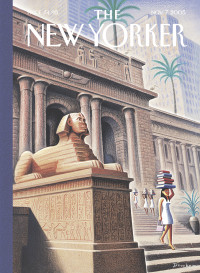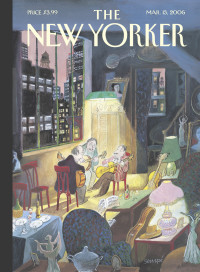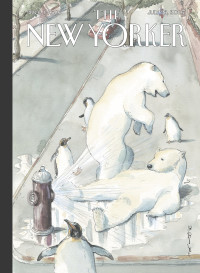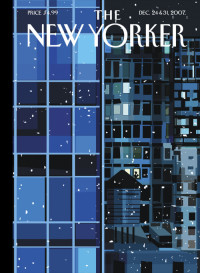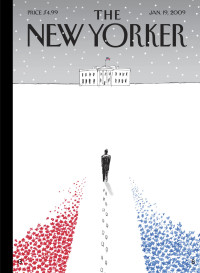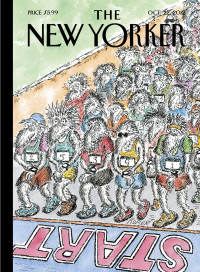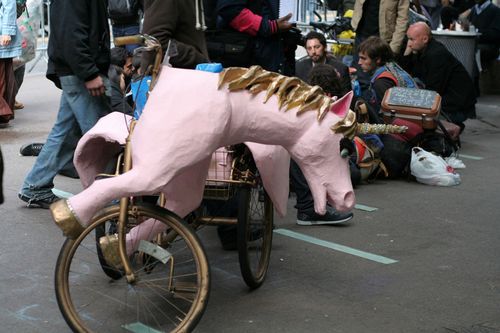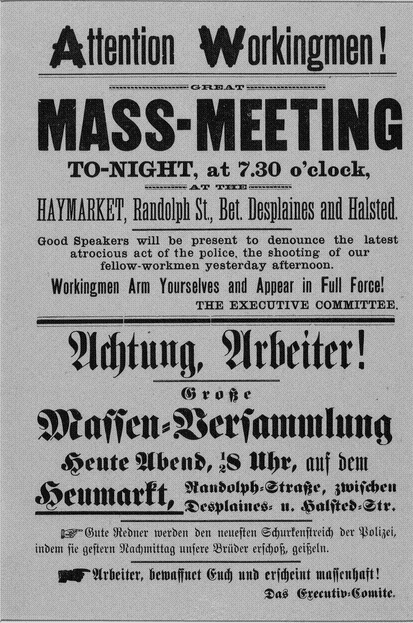My first inkling that Trump was where something had gone badly wrong in the American psyche came in the fall of 2015, when Peter and I went to a bar in Williamsburg to hear a friend read a short story. The emcee took a turn at the microphone himself, as his reward for having organized the literary evening, but instead of reading a story or poem, he read aloud from one of Trump’s ghost-written books. The choice of text was meant to be a joke, I think. A few sentences would have conveyed the gist: the book was horrible, and obvious in its horribleness, and representative in its horribleness of the person whose name was on the cover. The emcee, however, read for what felt like an hour.
It was excruciating. If the point was that we Brooklyn literary hipsters were superior to someone like Trump, and knew better than to be taken in by him, why was the emcee reading so many of his words? And why were we listening? I couldn’t figure out what was going on or what the emcee was getting out of it. He seemed to be in the grip of something, and we were in his grip. It was all happening under the sign of irony, but irony wasn’t the right word exactly. In retrospect I should have taken warning; at the time, of course, I just wanted it to be over.
I’ve thought back to the night many times in the past four years. It came to mind most recently when I was reading The Oppermanns, a remarkably lucid novel by Lion Feuchtwanger set in, and written in, 1933. The book, recently reprinted by the British feminist press Persephone Books, describes the lives of four Jewish siblings in Berlin, owners and managers of a chain of furniture stores, as they try to adjust to the rise of Hitler, referred to in the text only as “the Leader” or as “the author of the book called Mein Kampf.”
About a third of the way in, one of the siblings, Gustav Oppermann, who’s a bachelor and a bit of a playboy, in a bibliophile kind of way, is visited by a friend, Alfred François, the rector of an elite high school where two of Gustav’s nephews are students. One nephew has recently had a run-in with a new teacher, who happens to be a Nazi, and the rector wants Gustav to persuade his nephew to apologize. It has become dangerous to make Nazi enemies, and François intuits that he won’t be able to continue protecting Gustav’s nephew indefinitely. Once Gustav hears the story, however, and realizes that his nephew was in the right, he refuses to intervene, as a matter of principle, and the rector amiably gives up. After all, he doesn’t really want Gustav’s nephew to knuckle under. Having tried their best, to no avail, he and Gustav retire with relief to Gustav’s library, to chat about books. They are the most erudite characters in the novel, and Feuchtwanger pokes gentle fun at their erudition: the rector is said to be writing a book about the influence of the ancient Greek hexameter on an 18th-century German poet, and Gustav, to be writing a biography of a philo-Semite playwright from the same period. As a slightly perverse hobby, Gustav collects editions of the infamous anti-Semitic tract The Protocols of the Elders of Zion, then back in the zeitgeist, thanks to the rise of Nazism. After showing off his newest copy of the Protocols, Gustav picks up Mein Kampf and starts to “read some particularly juicy passages to his friend.”
Rector François covered his ears. He did not want to listen to the incorrect, distorted German of the book. Gustav spoke to him soothingly. On account of his repugnance for the style, he had evidently missed the comic quality of the content. He refused to be dissuaded from quoting a few passages.
Gustav proceeds to read aloud a few samples of Hitler’s name-calling, allegations, and conspiracy theories. “Rector François, disgusted as he was, had to laugh over this accumulation of nonsense,” Oppermann writes.
I felt the edge of this passage’s irony rather keenly.
I’ve been trying to stay logged out of Twitter, so I don’t know whether this week we’re making fun of people who see analogies between Trumpism and Nazism, or making fun of people who resist such analogies. In either case, I admit that as I read The Oppermanns, the analogies seemed to draw themselves. A character insists to himself that he still loves his country, despite what it has become. A character discovers, to his chagrin, that even people dear to him would rather minimize the new outrages to decency than see them for what they are (“It was disgusting to read the papers and disgusting to hear the row the Nationalists made. But who took that seriously?”), and that even people who are hurt by the new regime quickly accept their injury as part of a new status quo (“It was an old story that the Nationalists were dirty dogs. There was no need for anyone to come and tell them that”). What little I know of Q-Anon sounds very silly, but you would probably laugh over the claims in the Protocols of Zion, too, if, like François, Gustav, and (in 1933) Feuchtwanger, you didn’t know what they led to.
After a while, exhausted by my pessimism, I started to check my analogical bent by telling myself that it makes a difference that Trump does not have a paramilitary force at his command, independent of government control, as Hitler did, and that the misguided anarchists of our day have broken shop windows and mau-maued outdoor diners but have not yet given white supremacists the pretext that they are looking for—that is, our anarchists have not yet burned down the American equivalent of the Reichstag. And then I learned this week that a teenage white supremacist Trump supporter, responding to a call for law and order on Facebook, gunned down three protesters in Kenosha, Wisconsin, killing two of them, and that the shootings were later characterized by several pro-Trump TV pundits as a natural response to the protests in Kenosha, which the pundits saw as civic breakdown. So now the threat of attacks from vigilantes is indeed part of our political reality, and so is disingenuous justification of such attacks, and I have to fall back on consoling myself with the thought that the white supremacist in this case was a volunteer, not part of an organized militia. At least so far as we currently know. (A more sturdy consolation is that the American communities of color dog-whistled about and gaslit by Trump and the Trumpists are much more numerous, and therefore much less vulnerable, than Germany’s Jewish citizens were in 1933, when they comprised less than one percent of that country’s population.)
There’s a minor character in The Oppermanns named Friedrich Wilhelm Gutwetter who might be a portrait of Martin Heidegger. (Of course it’s possible that Feuchtwanger didn’t mean the reference to be that specific; there were no doubt many quisling intellectuals at the time.) At the opening of the novel, Gutwetter is a harmless-seeming, starry-eyed writer who happens to be fashionably pessimistic about the prospects of Western civilization. Since he’s oblivious to mere worldly concerns, it’s convenient that he is supported financially by Gustav Oppermann, who believes in his genius. When Gustav goes into exile, Gutwetter regrets his patron’s decision to leave with a curiously intense indignation, telling a mutual friend,
This country is about to give birth to a great new type of humanity. We have the enormous luck to be present at the birth of this gigantic embryo and to hear the first babblings of the noble monster. And our friend Gustav goes and runs away because one of the outcries of this nation in travail is offensive to his ears?
Gutwetter’s obliviousness to worldly matters, the reader senses, is starting to acquire an edge of intentionality. Gutwetter brings himself to accept Gustav’s exile to the extent of asking if he may borrow books from the library that Gustav has had to leave behind. Of course Gustav says yes. Before long Gutwetter succeeds in working his ideas about the new era’s new man into print, and soon he is enjoying a popularity that he believes to be world-historical:
He was not surprised that history had now, at last, made his, the poet’s, vision come true. The Nationalists, however, were surprised to find such a voice as his raised on their behalf. Almost all scholars, almost all artists of any standing, had turned their backs on the Nationalists. What a bit of luck it was that a great writer should now suddenly come forward to espouse their cause!
Feuchtwanger also makes an intriguing attempt to fathom the economics of fascism. He imagines that the Oppermanns have a less-successful rival in furniture-making, Heinrich Wels Junior, “a hard-working, reliable, slow-thinking man” whose error, in business strategy, is that he persists in having his employees craft tables and chairs by hand. By standardizing the designs of their furniture and by producing them more cheaply in factories, the Oppermanns have long been able to undercut his prices. “Had the recognition of solid merit died out in Germany?” Wels asks, aggrievedly. Well, no, Feuchtwanger explains; it’s just that most consumers care more about price. When Nazism comes along, Wels embraces it because “it freely expressed what Heinrich Wels had long secretly felt, namely that the Jewish firms with their cut-price methods were responsible for Germany’s decline.” After the Nazis put a higher tax on goods from the Jewish firm’s larger stores, Wels is able to come a little closer to competing with the Oppermanns on price—close enough that the new social stigma associated with buying from Jews is sometimes able to make up the difference.
A disconcerting aspect of The Oppermanns is that its moral universe seems continuous with ours—it’s a world in which people envy their neighbors’ apartments, and have mixed feelings about some of the poems in the national literary canon, and in which teenagers jockey for a chance to drive the family car—and incommensurate with that described in such Holocaust literature as Tadeusz Borowski’s This Way for the Gas, Ladies and Gentlemen. And yet one world turned into the other. Feuchtwanger is aware that the Nazis were setting up concentration camps, and even arranges for one of his characters to be imprisoned in one, but he doesn’t understand the full human meaning of such an institution; no one at the time could have. The book takes on an extratextual pathos; the reader realizes, that in 1933 Feuchtwanger couldn’t imagine that expropriations, beatings, humiliations, exile, and assassinations weren’t as bad as it could get.
An afterthought: While reading Jamelle Bouie’s roundup of the rightwing pundits who are acclaiming Kyle Rittenhouse for killing protesters in Kenosha, a link to which I have added above, I realized that the Rittenhouse story has a more specific parallel in The Oppermanns: When a teenager in Alfred François’s school, stirred up the new Nazi teacher’s fiery rhetoric, stabs to death a journalist who has made fun of Hitler’s writing style, Nazi pundits extenuate and even praise the murder in terms very much like those that Tucker Carlson, Ann Coulter, and others have used to justify Rittenhouse’s killings: “It soon turned out that [Rittersteg] was no scoundrel but a hero. The Nationalist newspapers published his photograph. They pointed out that, although the young man’s deed could not be unconditionally approved of, it was nevertheless easy to understand that a German youth would be aroused to do violence on account of the dead man’s dastardly assertions.”

